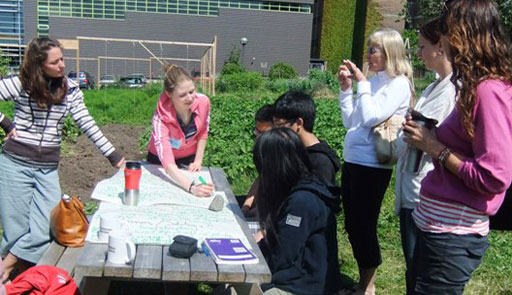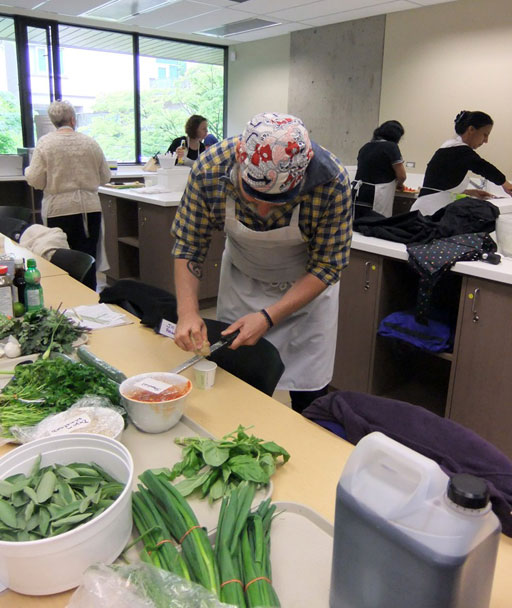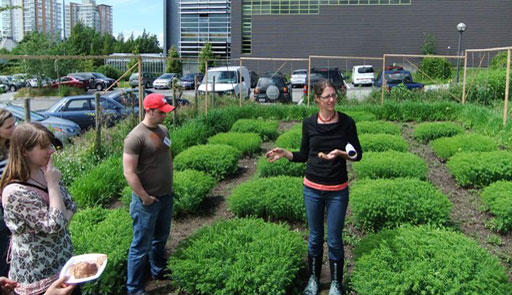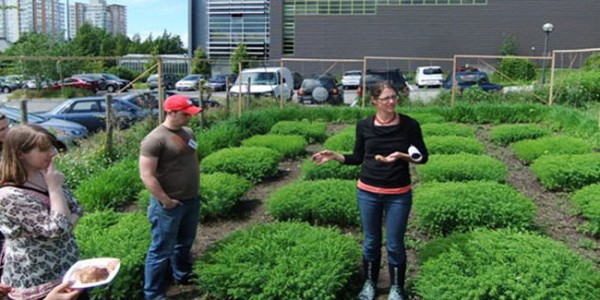Think & Eat Green summer institute – it’s all about the food

Small group work to share ideas about how all elements of the food cycle can be integrated into the curriculum from K-12.
Submitted by Sarah Carten, Community Nutritionist
Think & Eat Green @ School aims to change how children and youth in Vancouver schools learn about food, healthy eating, and their personal role in the larger food system.
Vancouver Coastal Health is a partner in Think & Eat Green because the program aligns with the VCH goal to promote better health for our communities.
Funded by the Social Sciences and Humanities Research Council (SSHRC), Think & Eat Green influences not only eating habits and eating attitudes, but also the ways of teaching and learning about food and sustainability that will lead to meaningful, lasting changes for both educators and students.
One of the key activities at the three day Summer Institute is the hands on learning for school staff and community partners. The energy and excitement of the staff and presenters throughout the three days of plenaries, workshops and breakout groups was palpable. Ideas and discussions were built upon hour-by-hour, leaving the participants, presenters and organizers inspired and ready for action.

Participants working through their one-hour task of making a salad with their secret, local fresh vegetables. Hands on learning helps teachers integrate healthy life skills such as cooking into their teaching.
“Every once in a while, I get the good fortune to attend an event that leaves me totally energized and inspired by the wonderful work that is going on in this city and this was definitely one of those events!” said one participant.
While the Think&EatGreen research project aims to improve eating habits and sustainable food choices, there is little talk of vitamins or greenhouses gases. Instead, there is a shared goal to generate enthusiasm about good food through planting, growing, harvesting, preparing, sharing, and composting it. The experience of smelling, tasting, and touching the fruits of their labours provides lifelong lessons in nutrition for both teachers and their students.
The Summer Institute models ways of teaching and learning that are experiential and firmly grounded in our local environment and community. The creativity of the presenters was astonishing, all of them modelling hands on teaching techniques, including milling wheat and weaving barley, fixing garden tools and building hoop houses, practicing digital storytelling, and harvesting and preparing foods.
The 2012-2013 school year will continue to bring Think&EatGreen initiatives into Vancouver classrooms through UBC student led projects, mini-grants, school staff professional development opportunities, and data analysis of the elementary and secondary school food environment as well as individual eating assessments. VCH is proud of the momentum generated by the project so far and looks forward to continuing to support meaningful changes in the school food environment to support and inspire students, staff, and the larger community to make healthy, sustainable food choices.
For more information visit www.thinkeatgreen.ca.

Garden classroom tour leader Julia Ostertag, University of British Columbia PhD Student, Faculty of Education. A “classroom” grown of flax provokes reflection about why we teach in the current structure of schools and indoor classroom spaces.

